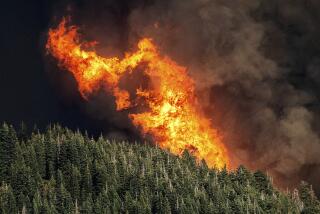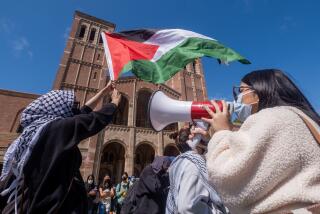A QUESTION OF HOPE
- Share via
BAGHDAD — The boom of tank rounds barely distracts Mais Haithem as she translates a poem by Victor Hugo from French into Arabic. The 21-year-old is used to the fighting by now. Her neighborhood, where there is hardly a sign that Iraq is holding an election tomorrow, is frequently a launching ground for insurgent attacks.
In another neighborhood, a young doctor who dreams of postgraduate studies in England keeps thinking about a close friend who was kidnapped two months ago and is probably dead. Riyadh Rubaie, 26, is worried that someone he knows will get hurt when people go to the polls.
The two twentysomethings are a far cry from the image of the angry Iraqi distrustful of the West. But both are disillusioned with their country’s current leaders; both harbor doubts about the capacity of any new government to improve their situation; both are bleak about the future of the country. And only one -- Rubaie, a Shiite Muslim -- plans to vote Sunday.
Hundreds of thousands, if not millions, of Iraqis are in the same position as Haithem and Rubaie. They are making private choices about whether to participate in an election that is being described as the most important in their lifetimes, but which could be a life-or-death decision.
Many are still on the fence, waiting for election day to see if they dare risk the walk to the polls. Even within some families, members are reaching different conclusions about whether to vote.
Their decisions appear to hang on both their individual circumstances -- the level of intimidation in their neighborhoods, for instance -- and, more important, whether they have any larger sense of hope.
That hope is rooted in part in whether their families are Sunni or Shiite. For Shiites, the road ahead seems fraught, but filled with a promise of empowerment unheard of over the last 30 years. For Sunnis, even those like Haithem who had no connection to the Saddam Hussein regime, Iraq is a place where their supremacy, and their sense of possibilities, is waning.
*
Like Mais Haithem, almost all of her neighbors are Sunni, and the area is known as Hai al Jihad -- neighborhood of the holy warriors. For the last week, her street has been awash in a fetid slush of stagnant rainwater and sewer water. She cannot walk out her front gate without plunging ankle-deep into the muck. A walk to the polling center would entail a disgusting slog, and remind her anew of how little she has gained from the ouster of Hussein.
“Have you seen our Venice?” she asked with a tired smile, gesturing to the watery street. “Sometimes I choke when I get up in the morning and look out. I want to cry because of what I see.”
She added softly, “Those in the government don’t know anything about our suffering.”
Her family makes do with six hours of electricity a day, and the violence in Baghdad in the last year forced the closure of the French aid organization where she had hoped to work after her university studies. For Haithem, who has lustrous dark hair that falls over her shoulders, it was the end of her dream of working in a language she has come to love.
Haithem has lived much of her life in the shadow of war. She was born during Iraq’s brutal war with Iran, was 6 during the Persian Gulf War, and now has lived through Iraq’s war with the United States.
When the Americans first arrived, she remembers a sense of doors opening. She and her family disliked Hussein, and his fall came as a relief. They hoped that their street, which flooded every winter, would finally be fixed.
Now, living in a neighborhood where gunfire is common at breakfast, she has lost faith in the Americans and the Iraqis who have worked with them.
“In the beginning, we had hope,” she said, sitting in a dim reception room darkened by a gray day and a lack of electricity. The only warmth came from a gas heater. “We thought we had gotten rid of a bad situation, but then the summer came and there was no security, the winter came and there was no security, and the summer came again and it was the same.”
The current government has failed to make improvements, so it is hard for her to imagine that a new set of faces would make a difference.
“First there was a Governing Council, and then there was this government, and what happened?” she said. “Nothing changed; in fact, things got worse.”
Her mother, Menil, nodded.
“At least under Saddam it was safer -- not because the government was Sunni, but just because it was more secure,” she said.
No one in Haithem’s family plans to vote: neither she nor her mother, nor her father, nor her elder sister. Her father, a conservative Sunni, accepts the assertion of the anti-American Sunni Muslim Scholars Assn. that a free election is impossible while U.S. troops are on Arab soil.
Haithem and her mother don’t want to talk about their fear that if they vote they might be attacked by insurgents. They skirt the topic; they make a point of saying that no one has personally threatened them.
But intimidation is high art in Iraq, refined and calibrated for years under Hussein, and it takes little to strike fear into those who remember life under the old regime.
Two months ago, one of their neighbor’s sons was killed. He worked for the Americans as a translator.
“His name was Beshar; he was young and they shot him in front of his house,” the mother said, looking out the window nervously. “I felt more nervous after that, but what can we do?”
She leaned forward, speaking softly as if she feared being overheard as she might have been under Hussein. “All the polling centers are threatened. I saw Zarqawi said it on Al Jazeera,” she said, referring to Abu Musab Zarqawi, the Jordanian-born militant believed to be behind some of the most violent attacks.
Haithem nodded.
“What if we go to the polls and someone starts shooting?” she asked.
The only remedy is for the U.S. to leave, Haithem said. The troubles, at least for Haithem and her family, have worsened since the Americans arrived; perhaps their departure would at least stop the insurgents from shooting in her neighborhood.
“The Americans are like a cloud. Wherever they are, there is fighting,” she said. “After they go and the Iraqis start building Iraq by themselves, maybe then hope will be created inside me again. But now the future is dark.”
*
Although their prospects may be different, the conversations within Riyadh Rubaie’s family have echoed those of their Sunni counterparts. Rubaie and his brother, Radhwan, have been talking about the elections for weeks with their mother and father, but they’re still divided over whether it’s worth risking their lives to vote.
Radhwan, also a doctor, is far more skeptical than his older brother about whether the elections will change anything. As they sat in their garden in the weak winter sunlight, occasionally pausing to listen to the sound of gunfire, they argued back and forth.
“The problem is that these lists of candidates don’t represent the real Iraq. Many people on these lists lived outside and we don’t know who they are,” said Radhwan, who hopes to go to the U.S. to become an ear, nose and throat specialist and has been studying for the U.S. medical exam for foreign-educated doctors.
In a complaint strikingly similar to Haithem’s, he said: “The people in the government for the past seven months -- they have not made anything better. Security is no better; electricity is no better; water is no better. So what difference will it make if I vote them? It will go from bad to worse.”
It has not helped that one of his closest friends, an interpreter with the U.S. troops, went to work at the United Nations one day and never came back. His car was found abandoned with blood on the front seat. Radhwan still hopes his friend will be found alive, but there have been no leads.
His mother, Fatin, nodded. The family’s next-door neighbor was killed by random gunfire, and she is worried that violence will touch her family on election day. Neither she nor Radhwan plans to vote.
Riyadh listened quietly, but disagreed with his brother. Iraqis needed to take the long view, he said.
“I agree that it is a real problem that we don’t know the people who are running security,” he said. “But the election is only a part of a series of steps. Then they will write a constitution and then hold another election, and we need to reach this step, to turn this page, and maybe then things will get better -- not right away, but maybe after two years or so.”
The family is mostly Shiite -- father Rabea is half Sunni -- but they think of themselves as Iraqis first. Riyadh is leaning toward voting for Adnan Pachachi, a secular Sunni who he thinks will run an honest government.
But he too has fears. There is his engineer friend who disappeared and is likely dead. Several of his medical school professors have been assassinated or kidnapped.
Although he plans to leave the country for study, he says he is enthusiastic about returning to pass on to his countrymen whatever knowledge he gains.
“I want to live in Iraq,” he said.
He seemed excited by the prospect of voting.
“Saddam Hussein tried to isolate our minds and to make us vote in arbitrary ways,” he said. “Now we can vote for anyone.”
He is influenced by his father, a retired brigadier general in the Iraqi army and an avid student of history. Although forced to join Hussein’s Baath party to advance through the military ranks, he has longed for Iraq to become a democracy.
Rabea takes an even longer view than his son. He sees his country as being on the same road as France and the American Colonies at the end of the 18th century. He is not especially enamored of those in the government, but nor does he think they will last.
“During the French Revolution, the time of Danton and Robespierre, people were so thirsty for democratic changes they raised the slogan that the revolution eats its own; and this democracy in Iraq is going to eat its own too.
“I am urging all my family to vote,” said Rabea. “They are all grown-ups, they have good religious backgrounds, good intellects, they will make good choices. This is just the first step in the democratic march; there will be many other developments and I want them to know that it is only the first step that is difficult. If they take this step, then the next will be easier.”
More to Read
Sign up for Essential California
The most important California stories and recommendations in your inbox every morning.
You may occasionally receive promotional content from the Los Angeles Times.












